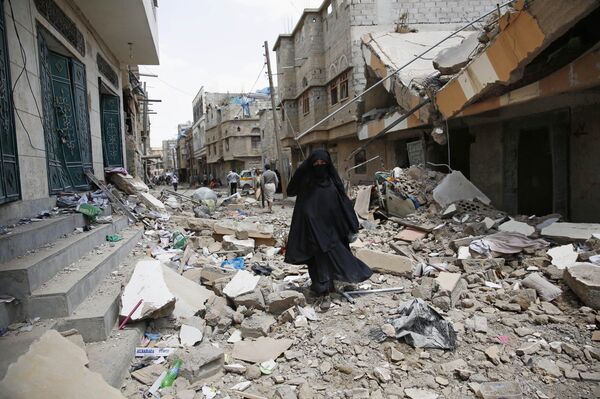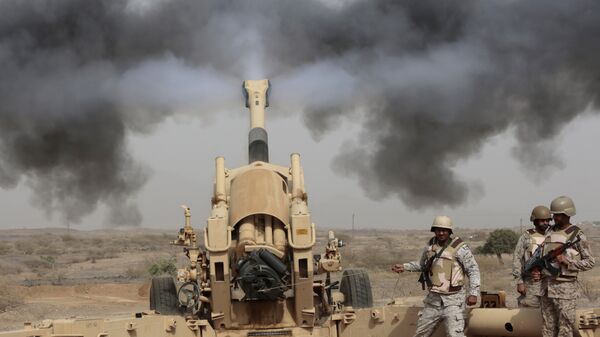On top of accusations of Saudi war crimes and human rights violations, the Amnesty International report called for a suspension on the transfer of arms to the kingdom.
— Jamila Hanan (@JamilaHanan) October 7, 2015
Great report @amnesty. US/UK need to stop providing arms where IHL is violated & civilians killed. Simple no? #Yemen https://t.co/qRvxNmp2jZ
— Ashli Hibbitt (@ahlabyrinthine) October 7, 2015
Following an investigation into 13 fatal airstrikes in Yemen's northern Saada protectorate between May and July, which resulted in more than 100 civilian deaths, Amnesty accused the Saudi-led coalition of having an "appalling disregard for civilian lives."
"More civilians have died as a result of coalition airstrikes than from any other cause during the Yemen conflict," the report said, adding that forces had attacked homes in "violation of international law."
"In at least four of the airstrikes investigated by Amnesty, homes attacked were struck more than once, suggesting that they had been the intended targets despite no evidence they were being used for military purposes."
Calls for Halt in Saudi Bombing
The Saudi-led coalition, which is backed with logistical and intelligence support form Britain and the US, has been heavily criticized for its bombing campaign in Yemen by a number of international organizations and humanitarian groups.
The UN called on Riyadh to halt its bombing of Yemen after releasing estimates, suggesting that more than 2,300 civilians had been killed and a further 4,800 wounded in the country since the airstrikes started in March.

A recent report released by the UN high commissioner's office found that close to two-thirds of reported civilian deaths "had allegedly been caused by [Saudi-led] coalition airstrikes, which were also responsible for almost two-thirds of damaged or destroyed civilian public buildings."
Many of the victims have not been rebel fighters, but Yemeni civilians, with reports of children as young as 12-months-old among those killed by airstrikes.
Saudi Arabia's stated aim of the bombing campaign is to oust the Yemeni Houthi rebel group, who illegally took control of large swathes of the country earlier this year, and subsequently, return the internationally recognized government of Abd Rabbu Mansour Hadi to power.

However, many critics have argued that Hadi's government merely acts as a puppet regime for Riyadh to strengthen its influence in the region.
Britain, US Under Pressure
While much of the criticism has been directed at Saudi Arabia, significant pressure has also been applied to Britain and the US over their roles as major arms suppliers to the country.
Its so cute how Western apologists refer to it as "Saudi's war" in #Yemen as if US & UK aren't actively involved https://t.co/XnNT2mjuJ7
— Mark Sleboda (@MarkSleboda1) October 1, 2015
British-made lethal weapons such as the 500-pound 'Paveway IV' bombs and Tornado and Typhoon jets are among those sold to Saudi Arabia, with the jets being used in the coalition's campaign in Yemen.
New @amnesty report on #Yemen: Call 4 Halt 2 Arms Transfers & Accountability 4 War Crimes https://t.co/jQGXb55EdN pic.twitter.com/wQAHMymCIX
— Donatella Rovera (@DRovera) October 7, 2015
While UK ministers have said they've been given "assurances" from Riyadh that British-made weapons are being properly used, Amnesty International UK's Arms Control Program Director, Oliver Sprague, says a proper investigation needs to be conducted.
"The UK government has previously claimed its arms are being properly used in Yemen, but what on earth is it basing this on? It seems to be no more than claims from the Saudi Arabian authorities themselves. With mounting evidence of the reckless nature of the Saudi-led coalition's bombing campaign in Yemen, the government must urgently investigate whether UK-supplied weaponry has killed civilians."
Donatella Rovera, Amnesty International's Senior Crisis Response Adviser who headed the organization's research trip to Yemen, said that Britain and the US have a responsibility to find out if their weapons are being used to kill civilians in Yemen or risk accusations of being complicit in the violation of war crimes.
"It demonstrates in harrowing detail how crucial it is to stop arms being used to commit serious violations of this kind. The USA and other states exporting weapons to any of the parties [in] the Yemen conflict have a responsibility to ensure that the arms transfers they authorize are not facilitating serious violations of international humanitarian law."


